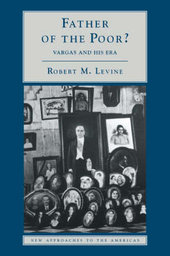
|
Father of the Poor?: Vargas and his Era
Paperback / softback
Main Details
| Title |
Father of the Poor?: Vargas and his Era
|
| Authors and Contributors |
By (author) Robert M. Levine
|
| Series | New Approaches to the Americas |
|---|
| Physical Properties |
| Format:Paperback / softback | | Pages:208 | | Dimensions(mm): Height 236,Width 156 |
|
| Category/Genre | Biographies: Historical, Political and Military
World history - from c 1900 to now |
|---|
| ISBN/Barcode |
9780521585286
|
| Classifications | Dewey:981.061092 |
|---|
| Audience | | Professional & Vocational | | Tertiary Education (US: College) | |
|---|
| Illustrations |
1 Maps; 18 Halftones, unspecified; 1 Line drawings, unspecified
|
|
Publishing Details |
| Publisher |
Cambridge University Press
|
| Imprint |
Cambridge University Press
|
| Publication Date |
28 January 1998 |
| Publication Country |
United Kingdom
|
Description
This book examines the life, times, and legacy of Getulio Vargas, Brazil's dictator and president during most of the period from 1930 to 1954. Levine's chief concern is how Vargas' legacy influenced Brazil, and to what extent his social legislation affected people's lives. Vargas ignored individual rights, working for state-regulated citizenship without disharmony, without the right to dissent. His revolution was partial; one in which new constituencies and rules were grafted onto traditional political practices. Vargas devoted as much effort to manipulating workers as he did to benefiting them. By the end of his long tenure in power, some things had hardly changed at all: the readiness of the armed forces to intervene; the elite's tenacious hold on privilege; and the historical predominance of the Center-South. Brazil's distribution of income remained among the least equable in the world, but Vargas did not perceive this as a problem that needed to be solved. That Vargas promised much and delivered little did not diminish the adulation that Brazilians held for him. Ordinary people would shrug and say 'O presidente sempre lembrou da gente' ('The President always thought about us').
Reviews"Father of the Poor is a compelling portrait of contemporary Brazil drawn from Brazilian archives, Vargas's personal diary of and suicide note, oral history testimony and photography, as well as recent Brazilian and non-Brazilian social history, anthropological and sociological scholarship." Michael LaRosa, H-Net Reviews "Levine provids a good picture of the extension of government social services under Vargas. The volume also has an excellent set of photographs and reprints interesting contemporary documents." Journal of Interdisciplinary History "...concise yet lively overview of the legacy of Vargas's government and the significance of his social policies. Levine's analysis moves adroitly between the voices of workers and their views of events and the musings of Brazil's most influential political, economic, and cultural leaders in the 1900s." Peter M. Beattie, Latin American Research Review "...a concise yet lively overview of the legacy of Vargas's government and the significanceof his social policies. Levine's analysis moves adroitly between the voices of workers and thier views of events and the musing of Brazil's most influential political, economic, and leaders in the 1900s." Peter M. Beattie, Latin American
|